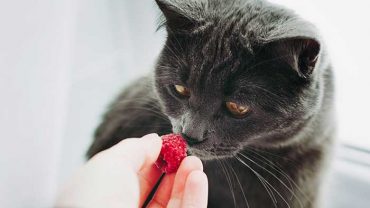Besides being incredibly delectable, raspberries are some of the most nutritious fruits out there.
If you own a cat, you may have found yourself fighting off the temptation to throw some raspberries to your feline friend. That’s because cats are known to be quite persistent when it comes to begging for human food.
In most cases, your furry, little friend will meow for raspberries due to hunger, which is understandable. But in other instances, the begging could all be out of sheer feline curiosity. Either way, you may have found yourself wondering, are raspberries safe for cats?
The short answer is yes, cats can eat raspberries, and there should be no immediate concerns to worry about. But as is the case with all human foods, you must watch the portions and ensure you offer raspberries to your kitto only as an occasional treat.
Read on as we delve deeper into the topic, discussing the health benefits of raspberries and the potential hazards of feeding too much of it to your cat.
Table of Contents
What Should Cats Eat?
In terms of nutrition, cats belong to a group of animals known as obligate carnivores. These are animals that can live exclusively on a diet of animal protein.
Unlike humans who must integrate plant matter into their diets to lead a healthy life, cats can derive all their nutritional requirements from a diet of meat. A cat’s body is also designed to synthesis some of the elements that it cannot obtain from animal protein.
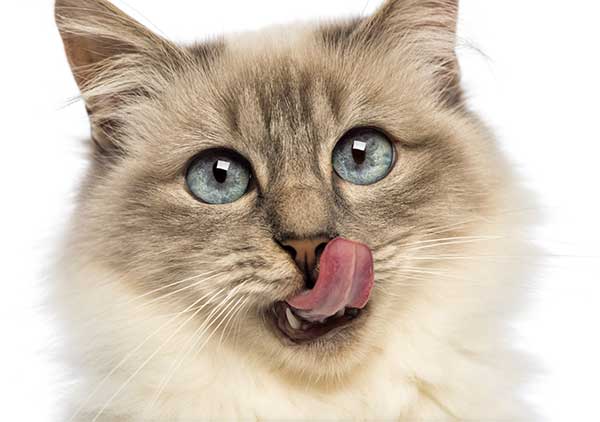
However, that doesn’t make plant matter entirely useless for felines. In fact, you may have observed as your cat nibbles on grass in your backyard. Grass, like most other green matter, helps relieve indigestion and treat nausea, among other health benefits.
When it comes to human foods for pets, the problem often lies in the method of preparation and the quantity that we offer to our pets.
So, can cats have raspberries?
They sure can. One of the best things about raspberries is that they don’t fall within any of the categories of foods that are discouraged for cats.
Also, raspberries pack a host of health and dietary benefits that your furball can leverage, over and above what the cat derives from its regular diet of animal protein.
Top Health Benefits of Raspberries
1. Boosting the Immunity
Raspberries contain numerous compounds that could significantly boost your cat’s immunity. For humans, a cup of raspberries provides more than 50% of the recommended minimum daily intake for vitamin C.
Vitamin C packs several antioxidant properties that could protect your feline friend from a wide spectrum of health conditions.
First, the antioxidant and anti-inflammatory properties of vitamin C are associated with modulating oxidative stress in animal cells.
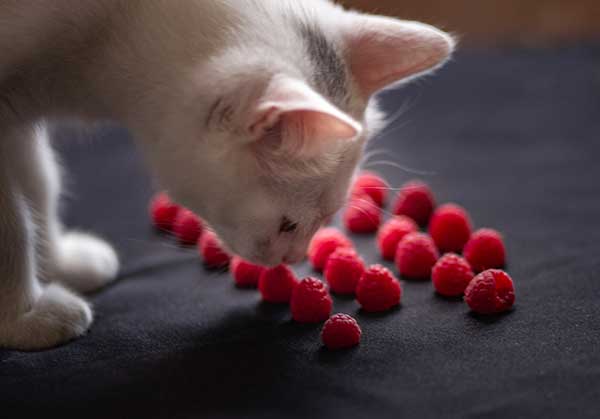
Oxidative stress refers to the imbalance between antioxidants and free radicals (oxygen-containing molecules that contain an uneven number of electrons).
A significantly high number of free radicals in body cells compared to the number of antioxidants is linked to various debilitating conditions. Examples include cancer, diabetes, heart disease, arthritis, etc.
Thankfully, the antioxidant compounds in raspberries help to restore oxidative stress, thereby boosting your cat’s immunity against these diseases.
Indeed, the studies conducted on the effectiveness of raspberries in fighting carcinogenic cells have all yielded positive findings. Not only does the fruit prevent the proliferation of cancerous cells, but certain compounds in it, such as ellagitannins, actually signal apoptosis (death) of cancerous cells.
Still on immunity, raspberries have been touted as one of the natural anti-diabetes foods. These fruits lower the amount of insulin that the body requires to regulate blood sugar levels. And lower insulin translates into reduced risks of developing diabetes.

So, while raspberries are remarkably sweet, it’s reassuring to know that the fruit contains only healthy sugars that will not impact the blood sugar profile of your feline friend adversely.
In any case, raspberries are classified among the lowest-sugar fruits, with one cup containing a paltry 5 grams of sugar. That explains why these berries are among the fruits mostly recommended for diabetic cats.
2. Boosting Digestion
Raspberries contain an abundance of fiber, with one cup boasting up to 8 grams of dietary fiber. Like most fruits, raspberries contain both soluble and insoluble fiber. Both forms of fiber come with a cocktail of benefits for your cat.
Insoluble fiber creates a sense of fullness. Therefore, you can incorporate it into your feline’s diet to monitor the cat’s food portions, as a measure towards preventing certain diseases, such as obesity.
Insoluble fiber is also instrumental in regulating your cat’s bowel movements. As the fiber isn’t digestible, it helps to bulk up the stool, causing food to pass through the alimentary canal more quickly.
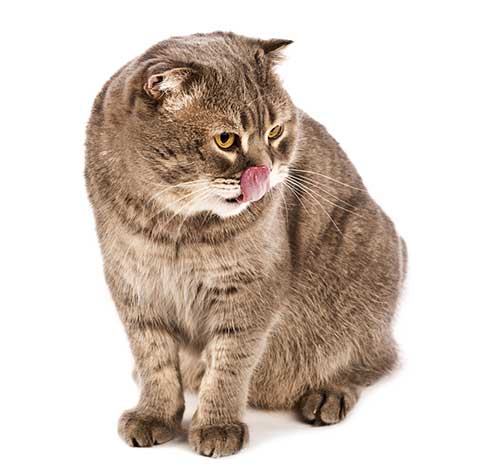
On the other hand, the soluble fiber that’s contained in raspberries attracts water during digestion, thereby turning to gel. As a result, it slows down the digestion process, preventing sugary and fatty foods from getting absorbed faster into the bloodstream.
Collectively, both soluble and insoluble fiber promote the health and growth of gut-friendly bacteria. These bacteria not only boost your immunity, but they also improve your mood.
3. Boosting Memory
The significance of retentive memory in pets cannot be overemphasized. Most importantly, a sharp memory makes pet training much easier, as a pet is able to remember places, events, and commands from years ago.
Raspberries come with immense memory-boosting benefits for cats.
First, by counteracting oxidative stress in the brain, the fruit prevents the damage of brain cells. Remember that oxidative stress is a risk factor for Parkinson’s and Alzheimer’s, two of the most severe diseases associated with the degeneration of brain functions.
And besides helping to keep these diseases at bay, raspberries also contain flavonoids that boost memory, mood, and coordination.
An occasional treat of raspberries will help to clear out all the toxic proteins that would have otherwise formed around your cat’s brain, thereby causing brain dysfunction.
4. Slowing Down the Aging Process
One of the many functions of the antioxidants contained in raspberries is the slowing down of the aging process.
The first way these antioxidants decelerate aging is by protecting your cat from physically debilitating infections, such as obesity, heart disease, cancer, and diabetes. Suffering from any of these conditions might leave your cat with a compromised immune system, even if the cat completely recovers from the disease.
Also, the antioxidants in raspberries might counter inflammation and scarring of the skin, which are all linked to premature aging. Not to mention, the compounds block enzymes that trigger age-related infections, such as arthritis, while also repairing your cat’s DNA.
Indeed, there are numerous ways that your cat might benefit from an occasional treat of raspberries. But as you shall find out, you must take certain precautions to ensure the cat doesn’t develop any side effects from snacking on the fruit.
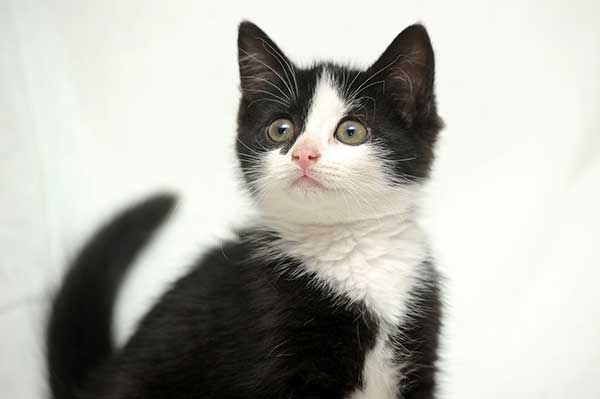
What Raspberries Can Cats Eat?
Raspberries exist in many forms, from jams to ice cream, yogurt, etc. But you may be wondering, can cats eat raspberry jam?
As we already mentioned, raspberries contain low amounts of sugar. However, that sugar content is still high enough to destabilize your cat’s normal blood sugar profile, especially if you offer the fruit to the cat in excess. Now, considering that jam also contains lots of added sugars and artificial sweeteners, cats should definitely not eat raspberry jam.
There’s also the question of raspberry ice cream, can cats eat raspberry ice cream?
Much like jam, ice cream contains added sugars and lots of artificial flavors, which make it toxic for cats. Besides, ice cream is made up of milk and as you may already know, our feline friends are highly intolerant to lactose.
Lactose is associated with numerous gastrointestinal complications in cats, ranging from abdominal pains to nausea, vomiting, diarrhea, and bloating. And since most ice creams also exist in frozen form, the cat might try to swallow it whole, leading to choking hazards.
And that brings into focus another interesting aspect with regards to the right temperature that cat food should have. While pondering about feeding raspberries to your feline friend, you may often ask yourself, can cats eat raspberries in frozen form?
According to veterinary experts, you should generally keep frozen foods away from cats. Cat foods that are meant to be cooked should be served to the cat warm, while foods intended for raw consumption should be served fresh and at room temperature.
However, there’s an exception to that rule. You can offer raspberries to your cat provided that you don’t add any seasoning, such as garlic, onions, and spices. Also, avoid adding sugar to the frozen raspberries, or anything that might upset your cat’s gastrointestinal system.
Another common question that’s related to cats and raspberries is – can cats eat raspberry yogurt?
No, they can’t. Yogurt also packs lactose, the very ingredient in milk that cats are intolerant to.
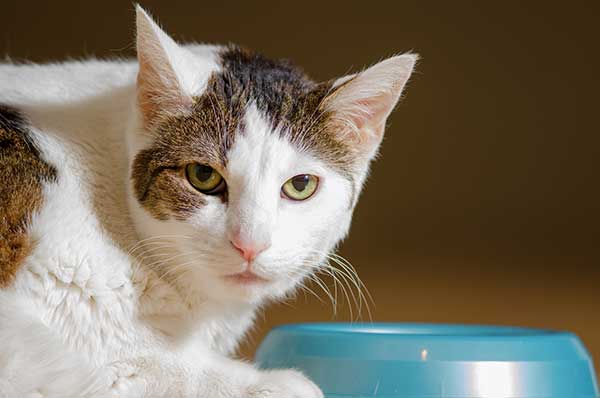
Lastly, as the raspberry fruit is generally harmless to cats, you could be wondering, can cats eat raspberry leaves too?
Raspberry leaves are considered harmless if they are fresh or carefully dried. However, beware of your cat nibbling on wilted raspberry leaves, as those could carry some toxicity.
Eating wilted raspberry leaves might lead to stomach problems, such as nausea and vomiting. Also, the leaves could contain residues of pesticides and other plant parasites that might be transmitted into your cat’s body, causing a variety of health complications.
Do Cats Love Raspberries?
Now, it’s one thing to assert that cats can eat a particular food and another thing to tell whether the cat will love that food or not. Fortunately, not only can cats eat raspberries, but your furball will also be blown away by the fruit.
Raspberries have a red color that makes them quite appealing to cats. Generally, cats don’t have an acute color perception compared to us. Unlike humans who can make out different shades of the same color, cats sort of see the universe in bleached and whitewashed coloration.
However, they’re often taken by flashy colors, which explains why most cat toys are made of bright and sparkling colors. And while the attractive red color will draw cats to raspberries, the delectable flavors of these fruits will keep your feline friend hooked.
But how do we know that our cat like raspberry or not?
That’s a no-brainer. If you offer a few portions of raspberries to the cat but it keeps begging for more, the chances are that your feline friend loves the fruit.
This may sound like a piece of good news to cat owners who’re keen on incorporating raspberries into the diets of their feline companions.
But it could also mean that your cat might sneak behind your back and help itself to more raspberries than it should. When that happens, the results could be devastating.
What Could Go Wrong If Cats Eat Raspberries?
Right off the bat, it’s important to emphasize that a cat will only experience adverse effects if it eats more than the recommended quantity of raspberries. And you may be wondering to yourself, what are these ideal portions and how many raspberries can cats eat?
Without meaning to belabor the point, you should remember that raspberries aren’t considered part of a cat’s staple diet. And while the fruit isn’t typically toxic to cats, there are still some things that you must keep in mind.
One or two raspberries per serving should do fine for your cat. The general rule is to serve raspberries to your feline friend occasionally as a treat. If the cat loves the fruit, you can take advantage of the situation to reward it using raspberries, any time the cat pulls some decent behavior.
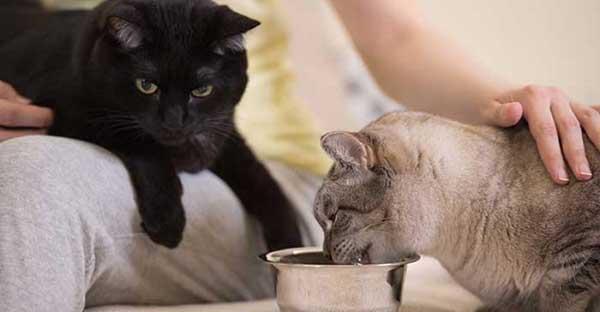
The following are some of the issues that might result from giving your furball raspberries in bulk quantity.
1. Gastrointestinal complications, such as nausea, vomiting, diarrhea, constipation, and gassiness.
2. Dehydration
3. Damage to the kidneys – Overdosage of raspberries can result in the formation of calculi in your cat’s kidneys, which is a risk factor for conditions like anemia.
4. Foul-smelling fecal matter.
These signs may worsen depending on the type of cat you own. So, which cats should not have raspberries?
First, avoid serving raspberries to cats with a history of gastrointestinal problems. Also, kittens shouldn’t eat raspberries as they have a rather sensitive stomach and a compromised immune system.
Therefore, anything that could possibly go wrong when cats eat raspberries will definitely go wrong when it’s a kitten that’s involved. Lastly, cats that develop any form of allergic reactions from eating raspberries should never eat the fruit, unless with a recommendation from your vet.

How to Serve Raspberries to Cats?
The following are some of the best practices when feeding raspberries to cats:
-
- Watch the portions.
- Offer only fresh raspberries to your cat. Frozen is okay as long as it isn’t laden with sugars, fats, or condiments.
- Serve plain raspberries, not mixed into ice cream, yogurt, or jam.
- Look for adverse reactions.
- Even if the cat ends up developing a taste for raspberries, remember that the fruit should be offered only as an occasional treat.
- Always talk to your vet before introducing raspberries to cats.
Final Word
Raspberries aren’t toxic to cats. However, remember that the fruits shouldn’t form part of your feline’s staple diet. Therefore, moderation is key.

